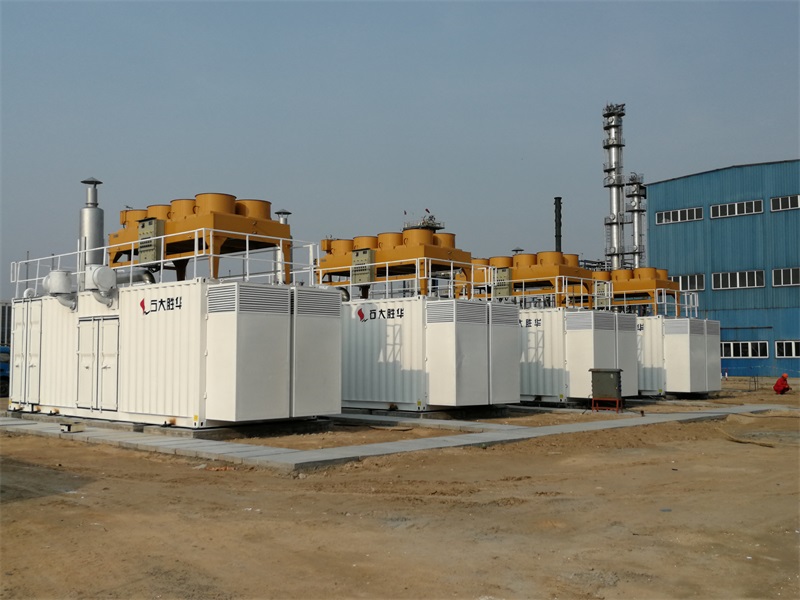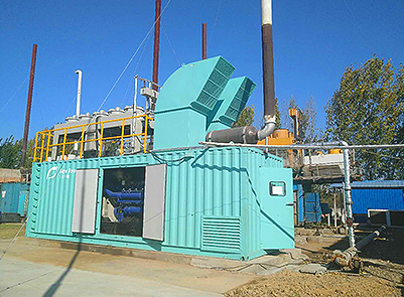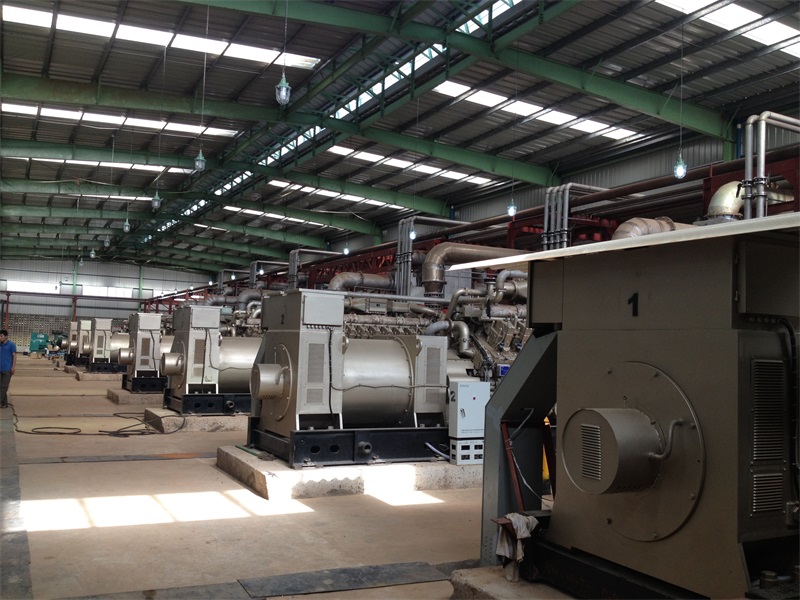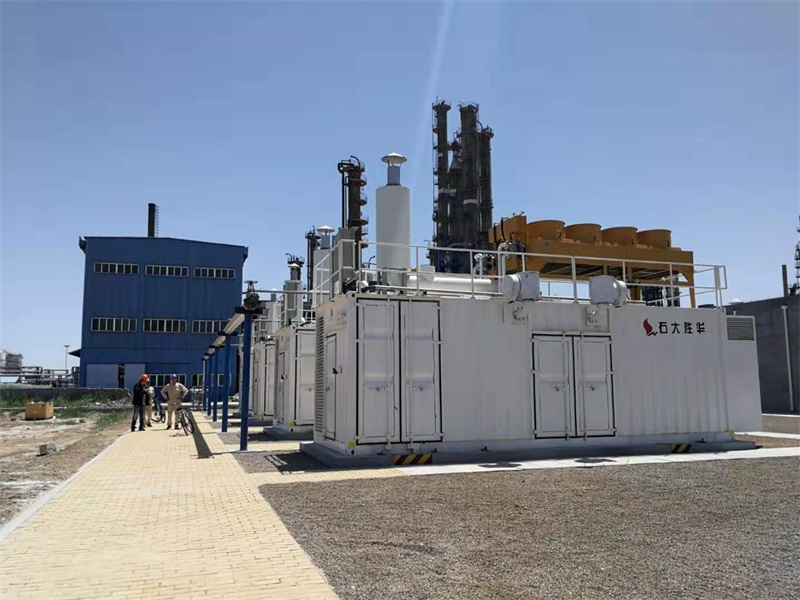低濃度瓦斯發(fā)電機(jī)組余熱回收的主要用途
低濃度瓦斯發(fā)電機(jī)組余熱回收的方式根據(jù)各個(gè)企業(yè)所需要的熱源不同有空氣置換余熱、軟化水置換余熱產(chǎn)生熱水以及軟化水置換余熱產(chǎn)生蒸汽三種。余熱回收后的主要用途有以下幾種:
According to different heat sources required by various enterprises, waste heat recovery methods of low concentration gas generator units include air replacement waste heat, softened water replacement waste heat to generate hot water, and softened water replacement waste heat to generate steam. The main uses after waste heat recovery are as follows:
(1)煤礦巷道暖井(風(fēng)井供熱風(fēng)):在北方的冬季,煤礦風(fēng)井巷道都需要熱風(fēng)爐暖井。把低濃度瓦斯發(fā)電機(jī)組產(chǎn)生的高溫尾氣經(jīng)過熱管空預(yù)器,將冷空氣加熱,可以得到高溫?zé)犸L(fēng)通過煙道與風(fēng)井處得熱管空預(yù)器再次換熱后的熱空氣送入風(fēng)井,從而降低井下熱風(fēng)爐的熱量輸出,節(jié)約電能。
(1) Coal mine roadway warming (air shaft heating air): In winter in the north, coal mine air shaft roadway needs hot air stove warming. Heat the cold air by passing the high temperature tail gas produced by the low concentration gas generator unit through the heat pipe air preheater to get the high temperature hot air, which is sent to the air shaft through the flue and the heat pipe air preheater at the air shaft after heat exchange again, so as to reduce the heat output of the underground hot air furnace and save electric energy.
冬季工況下:閥門12、21開啟,11、22關(guān)閉;同時(shí),42、51開啟,41、52關(guān)閉。礦井回風(fēng)順著回風(fēng)風(fēng)道1引至第三主風(fēng)道03,并以一定的風(fēng)速橫向掠過換熱器的蒸發(fā)段。液池中的工作液體受熱蒸發(fā),蒸汽在壓力差作用下向上的流入熱管較冷的冷凝段,放出汽化潛熱;
Under winter working condition: valves 12 and 21 are opened and 11 and 22 are closed; At the same time, 42 and 51 are turned on and 41 and 52 are turned off. The mine return air is led to the third main air duct 03 along the return air duct 1 and sweeps across the evaporation section of the heat exchanger at a certain speed. The working liquid in the liquid pool is heated and evaporated, and the steam flows upward into the cooler condensing section of the heat pipe under the effect of pressure difference to release the latent heat of vaporization;
回風(fēng)放出汽化潛熱后溫度降低,沿著第四主風(fēng)道04進(jìn)入排風(fēng)風(fēng)道4,終排至大氣或作為其它方式的熱源繼續(xù)使用;室外的冷空氣順著新風(fēng)管道5到達(dá)二主風(fēng)道02,吸收汽化潛熱,達(dá)到預(yù)熱目的;加熱后的空氣溫度升高到規(guī)定溫度以上,沿著一主風(fēng)道01進(jìn)入進(jìn)風(fēng)風(fēng)道2,終送入井筒內(nèi);冷凝后的工作液體在重力的作用下,回流到蒸發(fā)段的液池當(dāng)中。
The temperature of the return air decreases after the vaporization latent heat is released, and it enters the exhaust air duct 4 along the fourth main air duct 04, and finally discharges to the atmosphere or continues to be used as a heat source in other ways; The outdoor cold air reaches the second main air duct 02 along the fresh air duct 5 to absorb the latent heat of vaporization and achieve the purpose of preheating; The heated air temperature rises above the specified temperature, enters the air inlet duct 2 along a main air duct 01, and finally enters the shaft; The condensed working liquid returns to the liquid pool in the evaporation section under the action of gravity.
夏季工況下:閥門11、22開啟,12、21關(guān)閉;同時(shí),41、52開啟,42、51關(guān)閉。新風(fēng)溫度較高,蘊(yùn)含大量低溫?zé)崮?相反,回風(fēng)側(cè)溫度較低,可吸收新風(fēng)的熱量以達(dá)到冷卻新風(fēng)的目的。工作原理與冬季相似,在此不再贅述。
Under summer working condition: valves 11 and 22 are opened, and valves 12 and 21 are closed; At the same time, 41 and 52 are turned on and 42 and 51 are turned off. The fresh air temperature is high and contains a lot of low temperature heat energy; On the contrary, the temperature of the return air side is low, which can absorb the heat of the fresh air to cool the fresh air. The working principle is similar to that in winter, so I will not repeat it here.
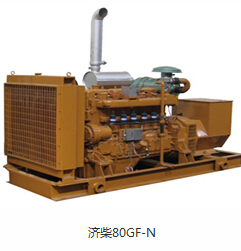

(2)烘干、采暖和洗浴用熱源:企業(yè)生產(chǎn)工藝中的烘干、采暖和洗浴常年需要熱源。在發(fā)電機(jī)組煙道出口加裝一臺(tái)熱管換熱器(熱管省煤器),通過熱水循環(huán)泵幾個(gè)低溫水送到熱管換熱器,經(jīng)過熱交換的軟化水為熱源(90℃以上)供給企業(yè)生產(chǎn)使用,冷卻后的軟化水在返回?zé)峁軗Q熱器,如此往復(fù)循環(huán)。
(2) Heat source for drying, heating and bathing: heat source is required for drying, heating and bathing in the production process of enterprises all the year round. A heat pipe heat exchanger (heat pipe economizer) is installed at the outlet of the flue of the generator set, and several low-temperature water is sent to the heat pipe heat exchanger through the hot water circulating pump. The softened water after heat exchange is used as the heat source (above 90 ℃) for the production of enterprises. The softened water after cooling is returned to the heat pipe heat exchanger, and so on.
(3)余熱制冷:目前廣泛采用溴化鋰吸收式制冷。用熱管蒸發(fā)器吸收低濃度瓦斯發(fā)電機(jī)組余熱回收的熱量。
(3) Waste heat refrigeration: At present, lithium bromide absorption refrigeration is widely used. Heat pipe evaporator is used to absorb heat recovered from waste heat of low concentration gas generator set.
(4)余熱發(fā)電:通過多臺(tái)瓦斯發(fā)電機(jī)組尾氣的余熱回收,安裝熱管蒸發(fā)器,產(chǎn)生的飽和蒸汽并往后拖動(dòng)汽輪機(jī)組進(jìn)行二次發(fā)電,發(fā)電后的冷凝水亦可制冷或者供暖,給企業(yè)帶來可觀的經(jīng)濟(jì)效益。
(4) Waste heat power generation: through the waste heat recovery of the tail gas of several gas generating units, heat pipe evaporators are installed to generate saturated steam and then drive the steam turbine unit for secondary power generation. The condensed water after power generation can also be used for refrigeration or heating, bringing considerable economic benefits to the enterprise.
低濃度瓦斯發(fā)電機(jī)組余熱回收的主要用途就是這樣了,我們從四個(gè)方面來講解了這個(gè)問題,對(duì)您有什么幫助嗎?歡迎來我們網(wǎng)站http://m.elmasticar.com咨詢查看更多相關(guān)事項(xiàng)!
This is the main purpose of waste heat recovery of low concentration gas generator sets. We have explained this problem from four aspects. Is it helpful to you? Welcome to our website http://m.elmasticar.com Consult for more information!
 在線咨詢
在線咨詢 官方二維碼
官方二維碼




 當(dāng)前位置:
當(dāng)前位置: 2022.11.10
2022.11.10
